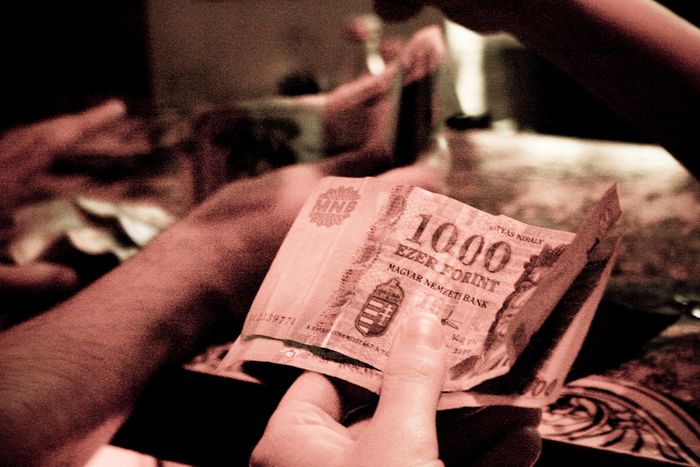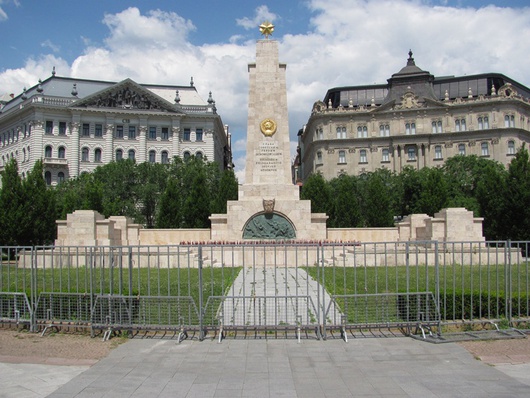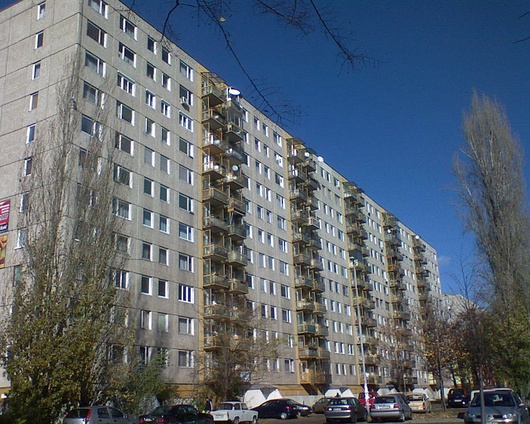
Hungary: From goulash communism to mortages in swiss francs
Published on
Translation by:
Emanuel Nevárez PagánAfter a decade-long transition from a relatively mild communist model to a capitalist democracy and tight budgetary measures by the government, the Hungarian economy began to flourish. However, this economic bonanza was short-lived as public debt began to mount, forcing thousands of families to gamble their homes by taking out mortgages in foreign currency.
Perhaps the old rickety Soviet train still carrying passengers through metro line three to the very heart of Budapest, the capital of Hungary, is the first thing to amaze the unaware visitor. Along the whole trip, Hundreds of advertisments now fill the space of old political propaganda along the entire trip, to remind newcomers of the nearly quarter of century that has passed since the fall of Winston Churchill's Iron Curtain and the peculiar form of Hungarian socialist state: goulash communism.
"We were the happiest barrack in the socialist camp" says Professor Sándor Gyula Nagy, an expert in European Studies and Vice Dean of Academic and Economic Affairs at Corvinus University. Economically speaking, the Hungarian model was a lot like the traditional dish: it had plenty of ingredients. Access to consumer goods was regarded as important and the system made a great effort to integrate some market-based mechanisms into the planned foundations of the economy. Small private businesses were allowed in the service sector, foreign trade was stimulated and exports on both sides of the curtain increased.
 But when the Berlin Wall fell, the rubble reached here, too. Hungary lost 70% of its exports and unemployment skyrocketed to 12% in only one year. The wreck of the industrial fabric fostered a very significant fall in GDP, the prices of basic necessities rose quickly as subsidies were withdrawn and many people found themselves in dire straits. "The government undertook the market reform by deregulating state companies, with some signs of corruption. But most of all, they needed to fight the external debt that was very high" Nagy explains.
But when the Berlin Wall fell, the rubble reached here, too. Hungary lost 70% of its exports and unemployment skyrocketed to 12% in only one year. The wreck of the industrial fabric fostered a very significant fall in GDP, the prices of basic necessities rose quickly as subsidies were withdrawn and many people found themselves in dire straits. "The government undertook the market reform by deregulating state companies, with some signs of corruption. But most of all, they needed to fight the external debt that was very high" Nagy explains.
Transition, deregulation...shock!
Conservative Prime Minister József Antall began a transition and tough adjustment programme that was to be applied by the next two governments. The first, headed by Gyula Horn — who led the conversion of the single party system into a western social-democratic one — deepened austerity through the Bokros Package, under the supervision of the IMF. "It consisted of shock doctrine above all," says Nagy. Derregulaton accelerated, academic taxes were intoduced, there were social bugdet cuts, currency devaluation and general loss of income. It was the most drastic programme ever applied in Hungary.
The right wing, most recently tied to current Prime Minister Viktor Orbán, made its best of the enormous impopularity of the package and came into power in 1998. But apart from tearing down the less popular though economically irrelevant measures, Orbán did nothing but keep the master lines of the previous administration intact. With ifs and buts, the Hungarian economy was growing for the first time and it started attracting foreign investments.
So, when the first Orbán administration sank in the 2002 elections amid accusations of power concentration and corruption, Hungary had repaid a significant part of its debt, reduced inflation and was growing at a sustained rate. The Socialists regained power in a moment of good perspectives, both politically and economically. The accession to the EU was to take place only two years later and the adoption of the single currency was foreseen as a mere formality to have been completed as early as 2008. The country was doing good.
Mortgages in Swiss Francs: it didn't seem as bad back then
Then, something incredible happened. In 2003, the emerging middle class started taking out loans in euros. "It all started in an Austrian bank," recalls Gabor Sziegel, former senior economist at the National Bank of Hungary and now a consultant. "Interest rates in euros were around 4% while they were at around 10% in forints. Somebody thought it was a good idea to sell them [loans] to Hungarian clients. In the beginning, to buy cars; then, they switched to mortgages."
From 2004 until the outbreak of the global crisis, the Swiss franc replaced the euro in the mortgage and credit business. "The exchange rate with the forint was convenient, the profit margin was higher and someone decided that it was a good idea to take the risk," explains Sziegel. So that's how thousands of families — 10% of the total population — decided to take the great leap: buy the car, go for some pretty little things or finally get out of the Soviet-era concrete blocks of flats (known as panelhaz in Hungary — Ed.). But the crisis toppled plans to enter the eurozone. In the meantime, the Socialists had significantly raised public spending, encouraged by good economic times, and the country became heavily in debt again.
 The return of austerity policies after the scandal caused by the Socialist Prime Minister Ferenc Gyurcsány's off-the-record declarations, where he admited to having lied to win the elections, was a hard blow to the families affected by loans in foreign currency. The subsequent devaluation of the forint doubled their debt, making it impossible to assume for the vast majority of them — even harder in a country with an average monthly salary of 350 euros. The paradox is obvious. Despite controlling the monetary policy, the benefits of the devaluation are diminished by an important side-effect: the automatic impoverishment of a large amount of the population.
The return of austerity policies after the scandal caused by the Socialist Prime Minister Ferenc Gyurcsány's off-the-record declarations, where he admited to having lied to win the elections, was a hard blow to the families affected by loans in foreign currency. The subsequent devaluation of the forint doubled their debt, making it impossible to assume for the vast majority of them — even harder in a country with an average monthly salary of 350 euros. The paradox is obvious. Despite controlling the monetary policy, the benefits of the devaluation are diminished by an important side-effect: the automatic impoverishment of a large amount of the population.
Now, who was responsible for this catastrophe? Professor Nagy doesn't hesitate: "Everybody. The banks didn't explain the risks, the citizens didn't consider them as they should and the government did very little to regulate this whole situation." Gábor Sziegel agrees though he emphasises some points: "I don't think the banks knew it was bad. The currency market and specifically the Swiss franc had been stable for almost 15 years; nobody could have predicted the Greek bailout would have provoked the aquisition of bonds in the secondary market and made exchange rates vary."
But he highlights one essential fact that makes this case unique. "Indeed, what was total madness, and the key point, was the switch to mortgages in Swiss francs. Because with the credits signed in euros you could at least affect one of the variables, that's the exchange rate with the forint. But if you take mortgages in Swiss francs, you're basing economic choices on two types of risk that you cannot control or affect: the fluctuation of the exchange rates between the franc and the euro and that of the euro versus the forint," admits Sziegel.
Europe has the key
How can this be prevented from happening again? It's hard, but both experts share the same fundamental beliefs. Coordination and multilateral agreements are needed between EU member states. "It's not that easy to remove this type of financial product from the market; the Bank of Hungary itself certainly opposed it, but could only warn people. If you ban the product on a national scale, then multinational banks just move the Hungarian clients' information to their franchises abroad and keep selling such loans. You can only prevent that with a common macroprudential regulation," assures Sziegel.
 When it comes to the advantages of keeping national currencies, Nagy shows some scepticism. "Whoever thinks that a small state can control its economy by the exchange rate doesn't know how the world works. That's controlled by the market as a whole! That's why we need to work for better European integration." A very peculiar lesson from a country where paradox seems to be the natural state of things. Maybe that's the reason why the old monolith to heroes of the Red Army shares its place with a bronze statue of Ronald Reagan in Freedom Square at the heart of Budapest. An image worth the best goulash.
When it comes to the advantages of keeping national currencies, Nagy shows some scepticism. "Whoever thinks that a small state can control its economy by the exchange rate doesn't know how the world works. That's controlled by the market as a whole! That's why we need to work for better European integration." A very peculiar lesson from a country where paradox seems to be the natural state of things. Maybe that's the reason why the old monolith to heroes of the Red Army shares its place with a bronze statue of Ronald Reagan in Freedom Square at the heart of Budapest. An image worth the best goulash.
This article is part of a special series dedicated to Budapest and carried out in the framework of AN EU project, intiated by cafebabel.com and supported by the European Parliament and the Hippocrène foundation.


Translated from Hungría: del comunismo goulash a las hipotecas en francos suizos



